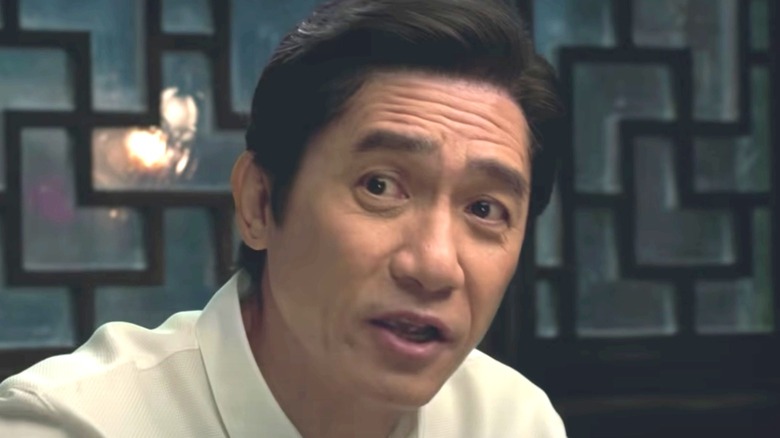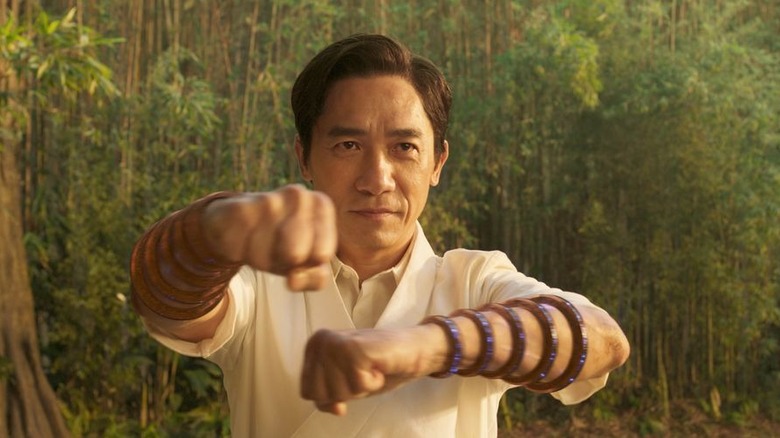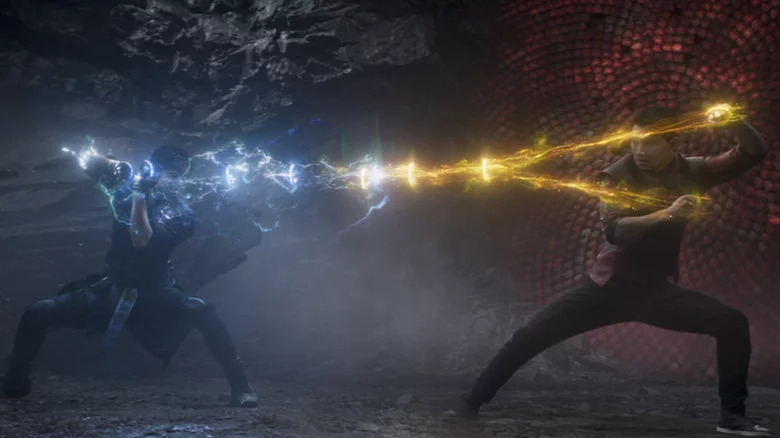The Mystery Surrounding The Ten Rings That Shang-Chi Didn't Answer
Contains spoilers for "Shang-Chi and the Legend of the Ten Rings."
There's an awful lot going on in Marvel's new "Shang-Chi and the Legend of the Ten Rings."
There's a new hero, played by Simu Liu, to introduce: his background, his skills, his world. In turn, there's a new villain, Wenwu (Tony Leung), whose existence as the leader of the Ten Rings has been hinted at since the dawn of the Marvel Cinematic Universe and who is tangentially related to another villain, Iron Man 3's fake Mandarin Trevor Slattery (Ben Kingsley), though neither of them would much like to claim it.
Because Wenwu is Shang-Chi's father, there's a whole paternal and familial backstory to be explored, featuring the hero's sister, mother, and aunt. All of that ties into a long-hidden village filled with mythical beasts, a dragon protector spirit, and a manipulative behind-the-scenes demon who in the comics was possibly the spawn of Cthulhu, though here looks like another dragon.
With all that ground to cover, it's no wonder the film kept a few secrets in its back pocket. Chief among them may be: Where do Wenwu's ten rings, the source of his power, originate? Who made them, and why is he the one who find them? The film doesn't tells us, but it does hint in its final moments that it's something that may be explored in another film.
What are the Ten Rings comic book origins?
In the comics, the rings were found by the villainous Mandarin –– a character Wenwu is partially based on –– while he was exploring the forbidden Valley of Secrets in his native China. There, he came across the wreckage of a spaceship belonging to the Makluans, a dragon-like race from the Andromeda Galaxy, and taught himself how to use the technology he found there.
The rings were once the ship's source of propulsion, and they each contained the soul of a long-dead warrior. This partially explained why each of the Mandarin's rings had a different ability, ranging from electrical projection to atomic-level matter transformation to mental control over anyone in close proximity. Add ten of these different powers up, and it's no wonder he dreamed of domination, a desire that would lead him to become one of Iron Man's most formidable foes.
The MCU's rings are different, worn on the forearms instead of the hands and featuring a formidable but less diverse set of powers. Producer Jonathan Schwartz told The Direct that the reason for this was partially to avoid similarities to the Infinity Stones, another collection of different objects worn on the hand, each with a different ability. The inspiration for Wenwu's rings instead came from the opening credits of the kung-fu classic "The 36th Chamber of Shaolin," where Gordon Liu's San Te is seen training while wearing heavy iron rings on his arms.
What might be the origins of the rings in the MCU?
What does that mean for the MCU's rings? At the time of "Shang-Chi and the Legend of the Ten Rings," they are an impressive if not wholly revolutionary weapon in the MCU. They wouldn't look out of place going against some of Tony Stark's gadgets or sophisticated Wakandan technology, but the film tells us Wenwu found them more than a thousand years ago (Which, okay, that they kept him alive for a millennium is pretty remarkable and unique). Wherever he got them from, it was a source far more advanced than anything Earth had in 1021.
"Shang-Chi" hints at elements that could pertain to the rings' comic origin story. The Great Protector of Ta Lo is a dragon, which could tie into the rings' Makluan origin story. More important, however, is the mid-credits scene in which Shang-Chi is brought by Wong to the Sanctum Sanctorum for a powwow with a pair of MCU heavy hitters, who tell him the rings are emitting a mysterious signal.
While we know little of how the post-"Avengers: Endgame" superhero hierarchy is going to shake out, who's in charge of what and so on, the presence of chief science guy Bruce Banner (Mark Ruffalo) at that meeting may indicate that the rings are a technology even more advanced than we know. The fact that space ranger Carol Danvers (Brie Larson) dropped by as well may imply that they're of alien origin.
Audiences will have to wait to find out who or what they're signaling, but when exactly the MCU might pick up this thread again –– "The Eternals?" A Shang-Chi sequel? An Avengers movie? –– remains to be seen.


